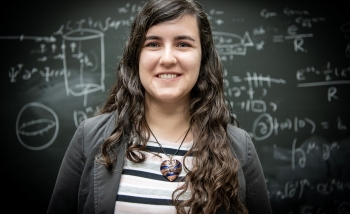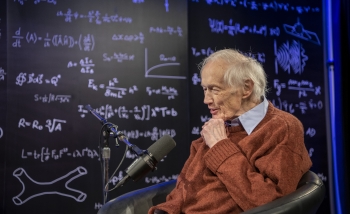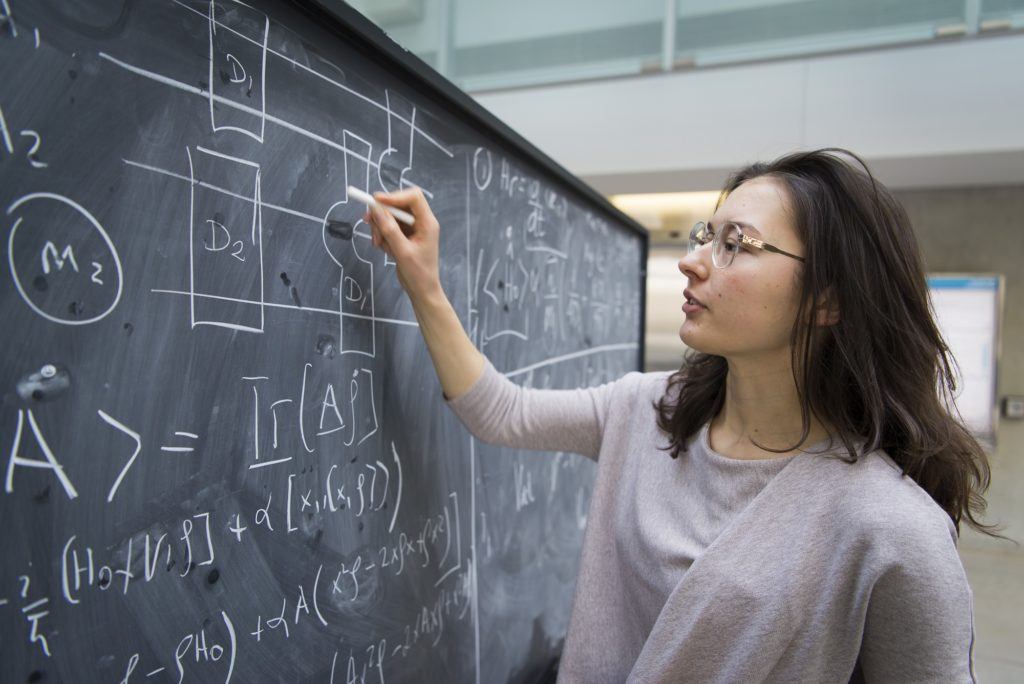For those who believe the many worlds interpretation of the strangeness of quantum mechanics, in another universe, Anna Golubeva might be an illustrious artist. In yet another, she might be a promising resident neuroscientist.
In the one we happen to occupy, Golubeva is a theoretical physics PhD student at Perimeter Institute who is paving the way to a deeper understanding of machine learning, with the goal of ultimately using it as a tool to solve major problems in physics.
It’s not the path she expected to follow. Golubeva, who grew up in Chişinău, Moldova (part of the former Soviet Union), came to physics rather late in her life. As a child, she dreamed of being a painter. In middle school, she toyed with the idea of being a mathematician.
Attending high school in Germany after moving there with her family at the age of 12, Golubeva finally made up her mind: she would study biology. Thus far, physics had not even entered the equation. “I didn’t like physics at all, and I was actually pretty bad at it, so I decided to drop it,” she recalls.
To graduate, though, Golubeva was required to have a certain number of hours of physics education. Hoping to get it over with painlessly, she enrolled in the most basic physics course her school offered.
In any other universe, her solution might have played out perfectly. But in this one, a clerical error opened an unexpected door.
“For some reason, the school didn’t have this basic course,” explains Golubeva. “By accident, they put me in the highest-level course for physics – and I loved it.”
It turns out that Golubeva wasn’t bad at the classical physics that forms the basis of most introductory classes: she was bored by it. “Once we started doing quantum physics, I found it very interesting.”
Not wanting to give up on her other interests, Golubeva opted to combine them by studying biophysics during her undergraduate degree. Amid a slew of empirically driven courses like biology, biochemistry, and chemistry, physics was appealing in its simplicity.
“Once I understand the principle, I can deduce everything and compute it. I don’t need to learn, like, 50 names of different mushrooms in Latin by heart,” she laughs.
It was enough to redirect her path completely: after undergrad, Golubeva went on to a master’s in theoretical physics at Goethe University Frankfurt. Still, she found herself craving more. “I felt like I was missing something,” she says. “I didn’t cover everything.”
Searching for more
At the tail end of her master’s, as Golubeva was weighing the merits of obtaining a PhD or going into industry, a little poster caught her eye. A master’s program in Canada, dubbed Perimeter Scholars International (PSI), promised to expose students to the full breadth of theoretical physics through research-driven coursework alongside some of the world’s leading theoretical physicists. “It sounded exactly like what I needed,” says Golubeva.
The experience did not disappoint. At Perimeter, Golubeva learned about relativity, quantum gravity, and more. Upon hearing of Golubeva’s interest in both complex condensed matter systems and machine learning, her PSI mentor introduced her to Perimeter Associate Faculty member Roger Melko, whose research bridges those topics.
“It was fantastic. Everything that I like, coming together as one. I had no idea at the time that I would be able to combine both physics and machine learning.”
Melko invited Golubeva to do her PSI essay research project with him. Impressed with the quality of her work, he offered her a PhD position in his research group at the University of Waterloo and at the Perimeter Institute Quantum Intelligence Lab. She accepted, choosing Melko’s group over several other academic offers and industry positions.
When Golubeva began to apply machine learning methods to physics problems, she had a realization. “[Machine learning] was driven by industry applications, and so it is completely lacking theoretical foundation. We don’t fully understand it. How can I apply it as a scientific tool if I don’t know exactly where I can expect reliable results?”
So, she decided to flip the problem. “It very naturally suggested the other direction – to apply my knowledge and methods from theoretical physics to study machine learning. We’re using physics to develop machine learning, and we use machine learning to solve problems in physics.
“There are a lot of problems in physics that we theoretically, in principle, know how to solve – but because the problem is so complex, and scales exponentially with the system size, we would need about 10,000 years of computer time to solve it with normal, classical computers.” Machine learning, she says, could be coupled with quantum computing to tackle these currently intractable issues.
Her work is a powerful blend of subfields that is already attracting attention. This year, Golubeva received the prestigious NSERC Gilles Brassard Doctoral Prize for Interdisciplinary Research, awarded annually to an outstanding recipient of an NSERC Vanier Canada Graduate Scholarship whose work crosses traditional boundaries.
Given the paths and branches she almost-but-didn’t follow, Golubeva is hesitant to speculate on what her future might hold. For now, she’s excited to focus on her research, though she also takes some time to relax through yoga, art, and – a rather unlikely sport for someone who has spent most of her life in landlocked cities – surfing.
For now, she says receiving the Brassard Prize adds tangible, meaningful support at a critical early career stage. She’s confident that interdisciplinary work is the key to unlocking some of the universe’s best kept secrets.
“Nature is not split into subfields of biology, physics, mathematics – it’s all one. Our understanding of nature can be advanced when we step over the boundaries between these academic fields.”
Further exploration
About PI
Perimeter Institute is the world’s largest research hub devoted to theoretical physics. The independent Institute was founded in 1999 to foster breakthroughs in the fundamental understanding of our universe, from the smallest particles to the entire cosmos. Research at Perimeter is motivated by the understanding that fundamental science advances human knowledge and catalyzes innovation, and that today’s theoretical physics is tomorrow’s technology. Located in the Region of Waterloo, the not-for-profit Institute is a unique public-private endeavour, including the Governments of Ontario and Canada, that enables cutting-edge research, trains the next generation of scientific pioneers, and shares the power of physics through award-winning educational outreach and public engagement.
You might be interested in


What is it like to be part of an underrepresented gender identity in physics?
February 9, 2024

